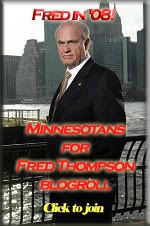In reaction to the charges that he lobbied for pro-abortion groups, Fred Thompson himself had this to say:
"The easiest and most generally used tactic when running against a lawyer is to trade off a general perception that most people dislike lawyers. Goodness knows that a lot of lawyers have earned disfavor but, as it turns out, folks understand our system better than a lot of politicians think they do. In my first run for the Senate, my opponent tried the old demagoguery route – “He has even represented criminals!” – to no avail.
A first cousin of this ploy is to associate the lawyer with the views of his client. Now-United States Chief Justice John Roberts addressed this notion during his confirmation hearings. “… [I]t’s a tradition of the American Bar that goes back before the founding of the country that lawyers are not identified with the positions of their clients. The most famous example probably was John Adams, who represented the British soldiers charged in the Boston Massacre.”
Roberts pointed out that Adams was actually vindicating the rule of law. Every person, unpopular or not, is entitled to representation. He further said, “That principle that you don’t identify the lawyer with the particular views of the client or the views that the lawyer advances on behalf of the client, is critical to the fair administration of justice.”
Like Adams, the views of attorney Abe Lincoln would have been a little hard to discern from looking at the positions he took as a lawyer. He represented the big railroad companies and on other occasions represented farmers and small land owners against the railroads.
Likewise during the Roberts confirmation, the New York Times reported on August 5, 2005 that as an appellate lawyer in the mid-1990s, Roberts gave advice to a gay-rights group that helped them win a 1996 anti-discrimination suit. Chief Justice Roberts had no direct hand in the suit. Rather, colleagues at his firm were handling the case and sought advice from a number of partners, him included. The group said that Chief Justice Roberts provided “invaluable strategic guidance” formulating legal theories.
I’ve experienced another gambit of those schooled in the creative uses of law and politics: dredging up clients – or another lawyer’s clients – that I may have represented or consulted with, and then using the media to get me into a public debate as to what I may have done for them or said to them 15 or 20 years ago. Even if my memory serves me correctly, it would not be appropriate for a lawyer to make such comments.
This situation does however bring to mind my many years in the law, and the nature of law practice in a country such as ours that prizes independence and individual rights. Of course, these values could not be protected without lawyer-client confidentiality or if lawyers were identified with the positions of their clients.
As an idealistic teen-ager I could think of nothing more inspiring than the notion of representing a just cause against the most powerful forces in the country, including the government. I’ve had a chance to do some of that. It’s fair to say that not all of my clients have been so praiseworthy. Some were, in deed, accused of crimes. Some were convicted against my best efforts.
The practice of law is a business as well as a profession. It’s the way you support your family. And if a client has a legal and ethical right to take a position, then you may appropriately represent him as long as he does not lie or otherwise conduct himself improperly while you are representing him. In almost 30 years of practicing law I must have had hundreds of clients and thousands of conversations about legal matters. Like any good lawyer, I would always try to give my best, objective, and professional opinion on any legal question presented to me.
I’ve had great personal and professional satisfaction because of my decision to become a lawyer. I made a decent living, served the rule of law, and I believe I did some good. I’ve had the opportunity to help small farmers in Tennessee, the Chief Justice of the United States, previously mentioned, and several folks in between, as well as a half dozen or so lobbying clients.
I was a federal prosecutor at the age of 27, Watergate Counsel at the age of 30, and served as special counsel to both the Senate Foreign Relations Committee and the Senate Intelligence Committee. In Tennessee, I served on the Appellate Court Nominating Committee and, of course, I was elected twice to the United States Senate.
I went on to do other things, too. Before election to the Senate, I appeared in several movies. The movie work was always an avocation for me and I continued to practice law throughout my “movie days” while continuing to live in the Nashville, Tennessee area.
Actually, my legal career led to my movie career. I took the case of a woman who was Chairman of the Tennessee Pardons and Parole Board. She stood up to the then Governor of Tennessee, we sued him and ultimately it was determined that he was corrupt. He, his legal counsel, and others went to jail. A book was written, and a movie was made about my client and our case and I was offered the opportunity to play myself in the movie, which led to other roles.
I’m certainly not surprised that such a diverse career is being mined by others. As we get further into this political season we will undoubtedly see the further intersection of law, politics and the mainstream media. However I intend to keep in mind the appropriate distinction and separation between law and politics, and I do not intend to get sucked in to doing a disservice to either of them or to myself."


No comments:
Post a Comment